- Search:
-
- Quicklinks:
2023 UNT Great Grads Fall
Danita Bradshaw-Ward
Ph.D. in Learning Technologies
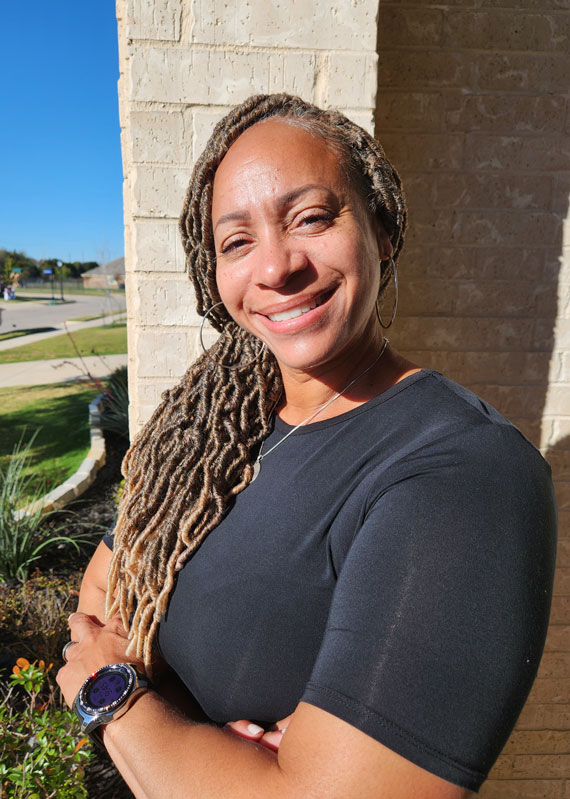 In middle school, Danita Bradshaw-Ward promised her father that one day she would
become a doctor.
In middle school, Danita Bradshaw-Ward promised her father that one day she would
become a doctor.
“My parents encouraged me, but they didn't necessarily know how to help me,” Danita says. “We just kind of figured it out as we went.”
A first-generation student from Burlington, Iowa, Danita wanted to make her family proud, earning her bachelor's and master's degrees in biology from Central Missouri State University.
While in grad school for her master's, Danita met her future husband. After they graduated, the couple moved to Dallas, where she worked as a Molecular DNA Technician in the Institute of Metabolic Disease, part of the Baylor Scott & White Research Institute.
After a year-and-a-half on the job, Danita decided to return to college to continue her journey to her doctorate. She had just finished her first semester at Dallas College's Eastfield Campus when she was asked to return not as a student, but as a part-time professor.
“Dr. Tammy Oliver, my anatomy and physiology professor, saw the potential in me and asked me to teach part-time,” Danita says.
Danita enjoyed teaching so much that she spent the next 20 years as a full-time biology instructor.
“I always wanted to be a medical doctor — or at least that's what I thought I wanted to be,” Danita says. “Once I got into education, I never looked back.”
Despite her career change, Danita remembered the promise she made to her father. She still wanted to become a doctor, so she once again returned to university in 2019.
“It was something that we always discussed, and I always told him that I wanted to be a doctor,” Danita says. “I knew I would one day. I just didn't know the avenue of the journey.”
To accommodate her busy schedule as a professor and mother of three, Danita enrolled in UNT's online program. The work was tough, but she credits the faculty with being there for her every step of the way.
“The first semester of the program I was like, ‘I think I made a mistake,'” Danita says. “I was going to quit, but my professors were like, ‘You can do this. Hang in there.'”
Danita's perseverance paid off, as she successfully defended her dissertation. Thanks to the support of her family, Danita is graduating from UNT with a Ph.D. in Learning Technologies. She hopes to use what she's learned to inspire and foster underrepresented students in the STEM field.
“I only had one teacher that was a black female from elementary school through college, and I did not have another black or black female instructor until I got into this program,” Danita says. “I want to be that example for my students.”
She plans to stay at Dallas College, using her new skills from UNT to help lift her students to new heights.
“It's surreal, but it feels great to be here,” Danita says. “I finally have those letters behind my name that I wanted for so many years.”
Republished Danita Bradshaw-Ward story from UNT Great Grads: Fall 2023
Carrie Burt
Learning Technologies
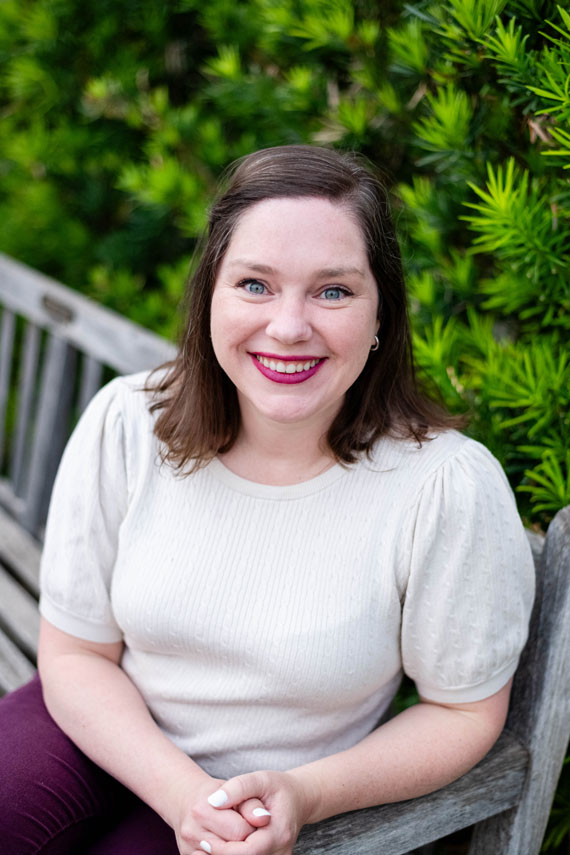 Carrie Burt already had a fulfilling career when she decided to pursue her master's
degree at UNT.
Carrie Burt already had a fulfilling career when she decided to pursue her master's
degree at UNT.
After more than a decade in education — including eight years as a teacher, curriculum writer and instructional coach at Frisco ISD, she discovered that her favorite part of her job was designing new methods to help people “learn in ways that stick.”
“I started looking at other jobs and thought, ‘If I were to apply for this instructional designer job, what would they want?' and I didn't have those things,” she says. “I realized I needed to build my skills, especially if I was going to future-proof my career.”
Carrie was drawn to UNT's online Master of Science in Learning Technologies because much of its innovative curriculum aligned with the work she was doing as a Title I instructional facilitator at Frisco ISD.
She'd earned her master's in teaching from Austin College in 2010, but returning to student life while balancing the demands of a full-time job was a bigger adjustment than she expected.
“I think the hardest thing for me was knowing that if I were a full-time student, I could really throw myself into it,” she says. “Especially at the beginning, letting go of that perfectionist tendency was a challenge.”
As a first-time online student, Carrie also found it harder to feel connected in a virtual environment. She recalls two instructors who went out of their way to get to know their students and provided opportunities for them to get to know each other.
One was Scott Warren, professor of Learning Technologies, who taught a game design course she took during the 2022 Winter Session.
“He did an amazing job. We had meetings multiple times a week on Zoom, and I felt like the feedback I was getting from him was legitimate,” she says. “We all designed a game, then we played each other's games. It was an intense three weeks, but that was a really exciting class.”
Clinical Associate Professor Deborah Cockerham, who now serves as director of the Learning Technologies master's program, also found ways to make online learning feel personalized and authentic.
“I appreciated her responsiveness and her drive to help us network,” Carrie says. “I told her I was interested in micro credentialing, and she got me connected with a professor at the University of Florida so I could meet with him and talk with him about it. I also appreciated that she had us working in groups — I got to know people I'd been doing discussion board posts with for a year and a half at that point, and I finally felt like I had actual school friends.”
Carrie was in her final semester when she interviewed for an instructional designer position at Peterbilt Motors Company in Denton. They were searching for someone who could bring a fresh perspective to their dealer training courses, and thanks to her years of experience and the specialized knowledge and skills she honed at UNT, Carrie aced it.
“When they asked questions, I had examples. I was able to say, ‘Oh, you need onboarding training? I've made onboarding training for three different companies. You want backend web development for your e-learning modules? Great! I've developed e-learning modules. Here's an example.' That's what UNT helped with the most — giving me the confidence to speak the language and opportunities to try new things and get feedback.”
Three months into her new role, she still feels the magic of landing her dream job.
“I get to wake up every day and think about the best ways to help people learn things,” she says. “I just come to work and think about learning all day long.”
Republished Carrie Burt story from UNT Great Grads: Fall 2023
Sara Dalanaj
Linguistics
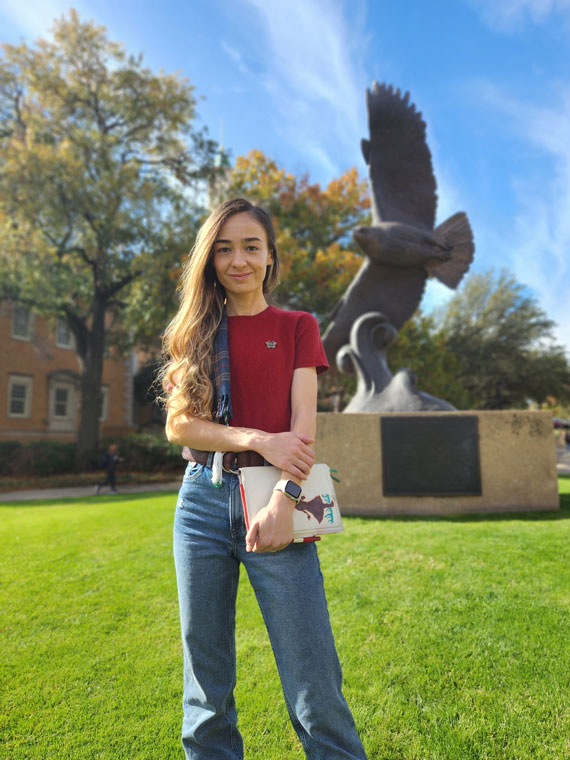 Sara Dalanaj has long had a proclivity for languages, learning six of them by the
time she was 20.
Sara Dalanaj has long had a proclivity for languages, learning six of them by the
time she was 20.
“Whenever I am exposed to a language, I immediately pause and listen,” Sara says. “Then, I'll seek out engagement with a native speaker because I want to know more.”
Her native language is Albanian, and due to international media influences in Albanian television during the '90s, Sara was exposed to significant linguistic diversity. By age 5, she began to converse in English, and by age 8, she had learned Italian from films and songs. Next, she learned Spanish and Brazilian Portuguese thanks to telenovelas “Carita de ángel” and “O Clone,” respectively. A few years later, she also picked up Bulgarian from her friends when she was visiting the country.
After moving from Albania to the U.S. and earning an associate degree at Dallas College, Sara transferred to UNT, where she excelled in the College of Information's Linguistics program.
“Even when Sara was going through challenges with her health, she never missed a single class or turned in late assignments. In fact, she continued to shine in her academic work,” says Lisa Hollinger, the College of Information's assistant director of marketing and outreach.
In less than two years at UNT, Sara even surpassed the requirements for her bachelor's degree by conducting original research that began as a research contract with the Honors College.
“My questions come from observations in Gheg that have puzzled me for years as a speaker of Tosk,” Sara says.
Gheg and Tosk are the two dialectal groups of Albanian, of which only the latter was favored politically to represent the formal Standard Albanian language during the linguistic reformation phase. Sara asserts that, despite five centuries of cultivation in orthography, Gheg and its linguistic prestige were diminished to the status of a dialect within a decade, a shift that she finds herself compelled to address.
In pursuit of answers to her research questions about Gheg's morphology, Sara began to elicit relevant words from her husband's side of the family, who are native Gheg speakers. A few months later, she recruited 450 more speakers from the city of Shkodër as online participants in the study, who helped her retrieve “Gheg gold,” in her words. This has helped her portray a real view of the dialect's evolution into the modern context.
With the invaluable support of her UNT faculty mentor and Principal Lecturer of Linguistics Konstantia Kapetangianni, Sara was able to continue expanding this research with its methodology and bring it to light in post-graduate circles of linguistics. This Fall, they co-authored the paper, “The Morphology of Participial Adjectives in Gheg Albanian” and submitted it for peer review in a linguistics journal.
“The Gheg Morphology project is far beyond the goals and expectations that I set at the beginning,” Sara says. “I poured my heart and soul into it, but it would have meant little without Dr. Kapetangianni having done the same. My gratitude to her is timeless.”
Sara's big family is beyond proud and excited for her contribution in the celebration of their language, which she says is “the most sacred element in the Albanian identity.”
It's not just her family, Sara's research has been widely recognized. In spring 2023, it represented UNT at the 43rd Annual Meeting of the Department of Linguistics of the Aristotle University in Thessaloniki, Greece, and in November, at the 15th Annual DFW Metroplex Linguistics Conference, where it garnered praise and applause.
“Beyond the Gheg research, earning my degree in Linguistics is important to me not only to check my interests in the scientific study of language,” she says, “but also to show my future children the indisputable value of education.”
Republished Sara Dalanaj story from UNT Great Grads: Fall 2023
Samuel Hubbard
Information Science
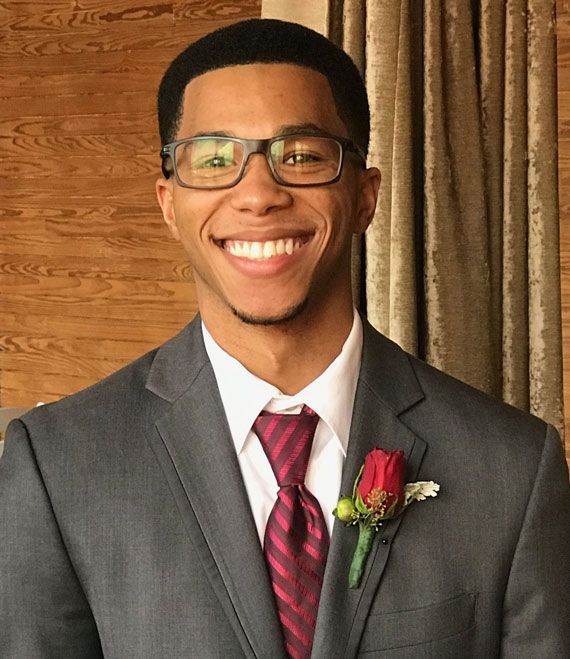 After a 13-year journey from Bastrop, Louisiana, to the UNT commencement stage, Sam
Hubbard is graduating with his bachelor's degree in Information Science
After a 13-year journey from Bastrop, Louisiana, to the UNT commencement stage, Sam
Hubbard is graduating with his bachelor's degree in Information Science
Choosing to stay close to home after high school, Sam commuted to the University of Louisiana Monroe, where he spent his first two years winding his way through four declared majors - from computer science to nursing to radiology and then to accounting - all while working three jobs.
Because of this Sam to struggle academically and lost his financial aid eligibility. “They told me if I wanted to be in school, I'd have to pay for it myself and I didn't have the money at the time so I decided to take some time off.”
So, Sam began working full time to save up money so he could eventually return to school.
A series of setbacks due to the passing of his grandfather and the father of his then-girlfriend, Sam experienced a fork in the road. His aunt suggested he come work for State Farm in Dallas, where she lived. Interested in exploring life outside of Louisiana, Sam made a decision that changed the course of his life. He got a job as a claims associate with State Farm and in November 2015, Sam packed his bags and made the move to Texas.
“The only person I knew in Texas was my aunt. I was starting a whole new journey in a completely new place.”
After a year at State Farm, Sam was able to leverage their tuition assistance program. Choosing the Computer Science program at Collin College, Sam started anew while working full time and attending night classes. By 2021, he had earned enough credits to transfer to UNT.
“It was a little discouraging at first, starting all over, but this time I did it right. I really learned that college was about managing your time, and once I started to manage my time better, I started doing better.”
One year later, Sam's life changed again with the birth of his son in March 2022 as well as the purchase of his first home. He also got promoted to a data analyst position with State Farm. Through balancing full-time work, full-time enrollment and significant life events, Sam navigated the challenges that came his way and ended his last semester with an impressive 4.0 GPA.
Sam attributes much of his success at UNT to his advisor, Sarah Kim, who guided him through his degree plan.
“For me, finishing college is important because I'll be the first one in my family to do so,” he says. ”It's about making my mom proud and showing others that it can be done no matter how long it takes.”
After graduation, Sam hopes to travel the world and then come back to UNT to pursue a master's degree. For first-generation, nontraditional students who might be traveling a similar road, he hopes his story can serve as motivation.
“Just because it's taking a long time doesn't mean it's bad. I learned a lot during my college journey, and as long as you learn how to manage your time and find a good support system, there's nothing you can't achieve.”
Republished Samuel Hubbard story from UNT Great Grads: Fall 2023
Coral Loach
Information Science
 Coral Loach grew up loving art.
Coral Loach grew up loving art.
“It was important to my parents that my brothers and I were able to create and make our own things,” says Coral, who immerses herself in painting, drawing, wire sculpting, crocheting and sewing and plans to try wood carving. “I love art. I love trying new mediums and just the ability to make anything I want.”
She even characterizes her math and science courses artistically, describing them as opportunities to, “solve puzzles and find patterns.”
Coral began her college journey during high school as part of the International Baccalaureate at Allen High School and started her pursuit of an Information Science degree in UNT's Honors College. That led to the discovery of a new canvas — the digital realm, where each bit and byte paint a different facet of knowledge waiting to be curated.
“It's such a versatile degree,” says Coral, who will complete her bachelor's with a concentration in Digital Content and Information Systems. “There is so much data in the world but then there are these voids where it gets lost. It's structuring information for access.”
Coral found that her artistic spirit led her to explore the balance between creativity and structure. Her passion for organizing information and creating meaningful connections led her to information architecture.
“I love the organization of it and designing digital spaces to be usable and accessible,” Coral says. “I had a class project where we designed a website and had to create the layout of a website. I was like, ‘I think I want to do this for a career, actually.'”
Armed with her degree, Coral now has her sights set on earning a master's and to one day become a librarian for a small town. A librarian not only poised to curate books but to create a vibrant hub, a community where literature and data converge seamlessly.
“Information technology isn't limited to a library and it's also not limited to creating a website,” Coral says.
Her advice to UNT students is to talk to their teachers and fellow classmates.
“Don't be afraid to ask for help or to inquire about how to improve yourself,” Coral says. “Your professors are there to help you — that's their whole job. I also think you have to have a willingness to practice something, even if you're bad at it. That will take you far.”
Republished Coral Loach story from UNT Great Grads: Fall 2023
Niharika Ravela
Master's in Data Science
 Niharika Ravela credits the strong, entrepreneurial women in her family for setting
the example for the person she strives to be.
Niharika Ravela credits the strong, entrepreneurial women in her family for setting
the example for the person she strives to be.
When Niharika was born, her mother Padmaja, was a teacher for almost seven years. She then started a flour company, something not typical to women during this time in their small town of Vijayawada, India. After Niharika's sister was born, her mom transitioned to teaching for a few more years, handing the company over to her husband, then ultimately making the final transition back to entrepreneurship. She continues to run the business today.
“I saw the balance and sacrifice she made for me and my family. It was inspiring.”
Leading the way for her family, Niharika's grandmother started not one, but two businesses and is still working today.
“She's been through a lot of loss, but always has wanted to keep working, keep being independent,” Niharika says.
Niharika's mother also enrolled her in all kinds of extracurricular activities growing up, from summer camps in music, skating and dance to essay and speech competitions - all of which she says helped her with communication skills.
“We spent late nights practicing debate with a fake microphone, pretending there was an audience in front of us,” she says. “My mom always taught me not to be afraid of anything and she would say ‘never give up.'”
Niharika attended an all-girls school in India for six years but yearned to have a better-quality education and an advanced degree. She decided to pursue the Master of Science program in Data Science at UNT, but her parents were not happy with her decision.
“They are very attached to me. My mom told me right before my visa interview that she hoped it didn't go well so I wouldn't have to leave her,” she laughs. “The Data Science program at UNT covers basic data modeling to machine learning algorithms and natural language processing, so it will basically open all of the requirements that I want.”
She loves the program and hopes to become a data scientist after graduation. Early in her journey, Dr. Sourav Chatterjee taught Niharika to carefully listen to what story the data was telling.
“I would say he was one of the best, most helpful and friendly professors I had.”
Niharika says her most important relationship at UNT was with Lisa Hollinger, assistant director of marketing and outreach at the COI.
She also has used UNT's career-readiness resources. She's connected with a mentor, Shad Griffin, data scientist at IBM, and worked with Anna Motes, career coach in COI.
“I still remember when I was on an edge to give up my job search because it was more than two months since I started. I met with Anna, and she kept me positive and calm. That kind of support is important to international students like me because we are under pressure to get things in order, which can cause heavy stress,” she says.
Following in her mother's and grandmother's industrious footsteps, Niharika landed her first-ever part-time job in the UNT Libraries Special Collections department, gaining professional experience as a project management assistant, now working in preservation.
“We get to see a lot of very cool stuff. I get to see the data from a different point of view, working with Microsoft Excel and Access, and I even got to review our website every semester.”
While working in this position, she has been nominated for both the Library Student of the Year and Marvelous Multitasker. She's also been involved in various organizations such as the Data Science Organization, Women in Computing and Society of Women Engineers.
Recalling how many activities and experiences her mother enrolled Niharika in during her youth also set the tone for her student career at UNT. She volunteers with the College of Information Ambassador Program, working at COI events, and volunteered as a teaching assistant at the Intensive English Language Institute. There she encouraged ESL speakers to engage with her using their language skills. Her service wasn't limited to the College of Information or even UNT, as she offered her talents to work with kids at the Youth Hackathon hosted at North Central Texas College last year.
Niharika fondly regards UNT has her home away from her home in India. She has advice for all students, especially international students, just starting at UNT.
“Be open to new experiences. Talk to people and get involved, even if you feel uncomfortable. That is where you grow.”
Republished Niharika Ravela story from UNT Great Grads: Fall 2023
Seth Wells
Master's in Library Science
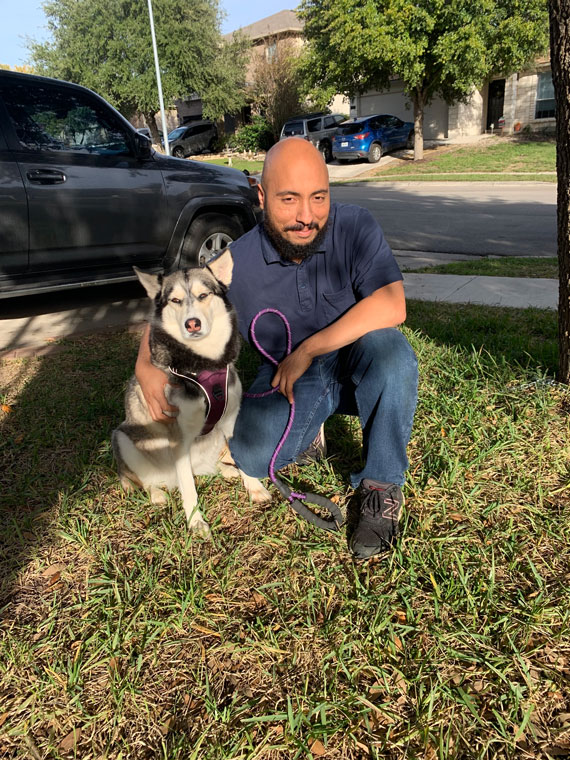 Seth Wells used his heart for history and animals to pursue his dream of becoming
a library archivist.
Seth Wells used his heart for history and animals to pursue his dream of becoming
a library archivist.
“I love animals - of all kinds, and I love my job at the Converse Animal Shelter because I am able to help the animals in my community,” says Seth, who earned a bachelor's in history in 2021 from the University of Texas at San Antonio (UTSA).
His goal was to earn a graduate degree, but he also wanted to be close to Converse while still doing what he loves in the meantime.
During his last year of undergraduate work, Seth received some great advice from one of his professors: UNT has a great American Library Association online accreditation program for people seeking archival and record management careers. With no hesitation, Seth applied.
UNT Online offered Seth a way to stay close to home and earn that coveted advanced degree.
“Online learning may not be for everyone, but online was definitely for me,” Seth says. He made his own schedule, planned when to study and determined what works best on his own timeline. Discipline is the key to his success.
Balancing work and school was challenging, but with his strict daily routine, he's been able to persevere. Seth wakes every day at 5:30 a.m., works from 8 a.m. to 5 p.m. at the shelter, and then focuses on projects and coursework until bedtime.
With an impressive set of remote internships, including the Library of Congress in Washington, D.C., he already has spent countless hours cataloging and archiving to preserve pieces of our collective past.
“The Library of Congress internship is something I'm really proud of, and the experience was priceless,” he says.
With passion, determination and grit, Seth lives every day committed to reaching his goals — whether it's saving the animals he loves or making sure history doesn't get lost.
“Ask yourself what you want in life, make a plan and go for it,” he says. “Choose what's best for you.”
Republished Seth Wells story from UNT Great Grads: Fall 2023